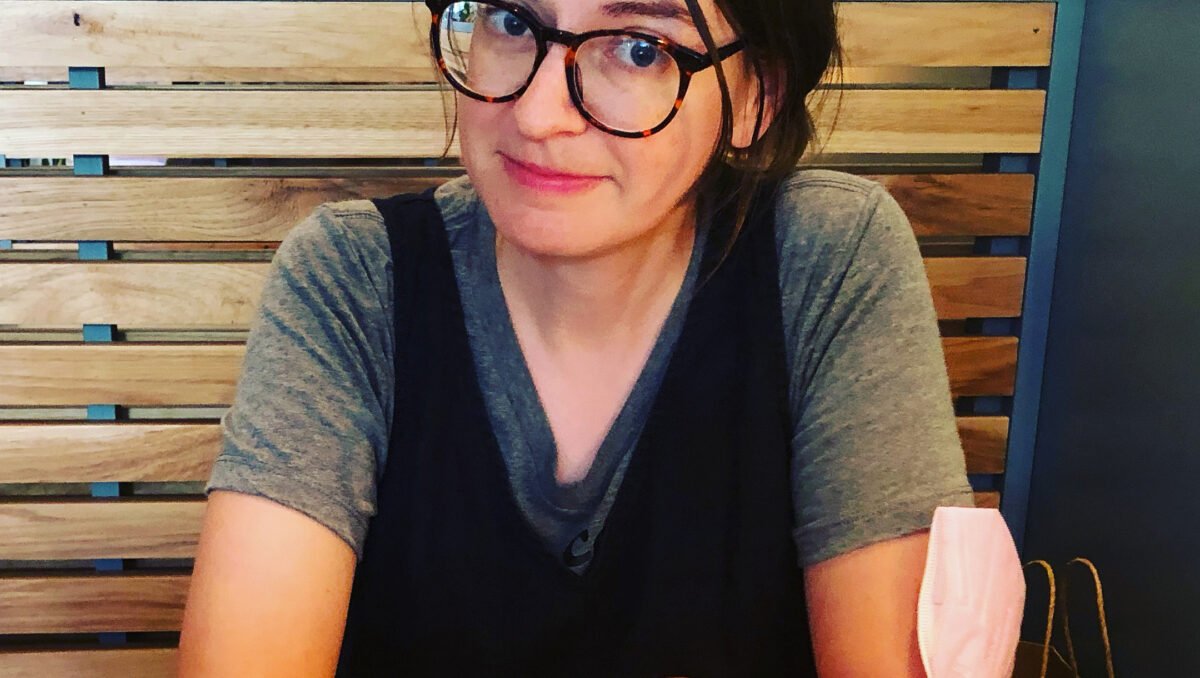INTERVIEW with ROBIN LAMER RAHIJA
Robin LaMer Rahija‘s first full length collection, Inside Out Egg, was released in April. Ada Limón writes that “each poem contains the whole unbound strangeness of the human experience–the offhand remark, the blur of being in a body– all of this is written with a humility and understated wit that both growls and sings….” We were thrilled to interview Rahija about her process in crafting Inside Out Egg, as well as the development of this collection’s voice and the nature of the absurd– both in poetry and in the world around us.
FWR: Your poems conduct us into a theater of the absurd where you satirize our fears, our peculiar tendencies and our most ridiculous but touching attitudes. Your voice rings with audacity, and performance, as well as rebellion. When you say, “Something just feels wrong”— about our culture, our lives today, our attempts to find each other, the reader believes you. But, the tender, humorous way your poems express both the wrong and the small touches of “right” give us, your readers, both pleasure and hope in finding community.
I’m fascinated by the short poems that you’ve interspersed in your text that raise mind-boggling questions like “who’s to blame for this bad dream” and comment on the many uses of the preposition “for.” Did you conceive of them as breaks or respites, or did you have other thoughts about their place and placement in your book?
RR: Do you mean the Breaking News poems? The Breaking News poems I thought of as interruptions, like when we’re having a meaningful interaction with someone and the news app on the phone pings with something insignificant, or significant and horrifying, or stressful, and then the moment is gone. I wanted them heavy in the beginning and then to fade away as the book sort of settles into itself and the voice becomes more focused.
FWR: I think many writers and readers, including me, are interested in questions of process. Would you tell us a bit about your process—how a poem begins for you, if there are recognizable triggers; how you develop that initial impulse; how you revise, and so on.
RR: I think about this a lot. It might be different for every poet. It seems like magic every time it happens. Often it’s phonic. I’ll hear a phrase that sounds cool, and it will get stuck in my head like a song lyric. A friend of my told me a story about seeing a fox on the tarmac as they got on a plane, and I’ve been trying to work the phrase “tarmac fox” into a poem ever since. Other times it’s more about just noticing language doing something weird. I was watching the Derby the other day and a list of the horse names came up, which are always ridiculous: Mystik Dan, Catching Freedom, Domestic Product, Society Man. So now I’m thinking about a list poem of fake horse names, or what they’d name themselves, or what they’d name their humans if they raced humans for fun. The trick is training yourself to notice those moments, and also to note them down and not just ignore them.
FWR: Also, to my ear, you have a very strong, confident, even outspoken voice in your poems. One example that caught my ear is your title, “I Can Never Put a Bird in a Poem Because My Name is Robin” and “That Is Not Fair That” voice, to my ear, is quite brave, as well as funny. How did you develop that voice, or was it always natural to you?
RR: No, it’s definitely not my nature. I had to write my way into this voice. I started out writing language poetry that was just pretty sounds with no meaning. I was avoiding writing (and thinking about) the hard things. Writing for me has been a lot of chipping away at my own walls. Each poem too I think has to work on becoming that confident through revision. I don’t want my poems to be complaints. I want them to reveal something, but it can be a fine line. I’m a jangly bag of anxiety most of the time, and I think my poems reflect that. Writing is an attempt to make the jangles into more of a coherent song.
The humor is mostly accidental, I think. Or maybe it comes from an inability to take myself seriously. I do want to get the full range of human emotions out of poetry, and humor is a big part of how we get through the day.
FWR: Who are you reading now? And are the poets you read representative of anything you would describe as “contemporary”? Is there such a thing now? I’m thinking of Stephanie Burt’s essay describing recent poetry as “elliptical,“ meaning the poems depend on “[f]ragmentation, jumpiness, audacity; performance, grammatical oddity; rebellion, voice, some measure of closure.” Does any of this ring bells for you?
RR: I haven’t read that but it feels true for my work. I’m reading Indeterminate Inflorescence by Lee Seong-bok from Sublunary Editions right now. It’s a great collection of small snippets, like poetry aphorisms, that his students collected from his classes. I don’t know how I’d describe contemporary poetry, except it feels brutally personal and outwardly social at the same time.
SO MANY by Robin LaMer Rahija
beautiful things lived here.
That small boned bird that glowed in the understory.
That big wide mushroom that was underneath us that whole time.
That elm the autumn of the drought when the leaves fell before they changed.
I stood under a field of green on a field of green on a field of green.
I understood then. There is no need to hurry death forward.
